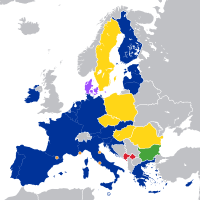Enlargement of the eurozone

The eurozone is a group of countries that use the same money, called the Euro. When we talk about enlargement of the eurozone, it means that more countries want to join this group and start using the Euro as their currency.
Imagine you have a club of your friends, and you all use the same toy. But some of your friends who are not in the club also want to play with that toy. So, they want to join your club so they can play and share the toy with you.
Similarly, when a country wants to join the eurozone, they need to meet certain conditions set by the club's rules. One of the rules is that their economy should be strong enough to use the Euro responsibly. It means that they should have a stable currency, low inflation, and manageable levels of government debt.
Once a country meets these requirements and is accepted into the eurozone, they start using the Euro as their currency. It makes trade and travel easier between countries since everyone is using the same money.
However, enlargement of the eurozone is not an easy decision, and countries need to weigh the pros and cons of joining. For example, adopting a new currency can have both positive and negative impacts on the economy. It can improve trade and integration with other eurozone countries but also limit the country's monetary policy options since they do not have control over their currency anymore.
In summary, enlargement of the eurozone means that more countries want to join the club of countries that use the Euro as their currency. Countries need to meet certain economic criteria before joining, and once they do, they start using the Euro. However, it is not an easy decision and has both positive and negative impacts on the economy.
Imagine you have a club of your friends, and you all use the same toy. But some of your friends who are not in the club also want to play with that toy. So, they want to join your club so they can play and share the toy with you.
Similarly, when a country wants to join the eurozone, they need to meet certain conditions set by the club's rules. One of the rules is that their economy should be strong enough to use the Euro responsibly. It means that they should have a stable currency, low inflation, and manageable levels of government debt.
Once a country meets these requirements and is accepted into the eurozone, they start using the Euro as their currency. It makes trade and travel easier between countries since everyone is using the same money.
However, enlargement of the eurozone is not an easy decision, and countries need to weigh the pros and cons of joining. For example, adopting a new currency can have both positive and negative impacts on the economy. It can improve trade and integration with other eurozone countries but also limit the country's monetary policy options since they do not have control over their currency anymore.
In summary, enlargement of the eurozone means that more countries want to join the club of countries that use the Euro as their currency. Countries need to meet certain economic criteria before joining, and once they do, they start using the Euro. However, it is not an easy decision and has both positive and negative impacts on the economy.
Related topics others have asked about:
